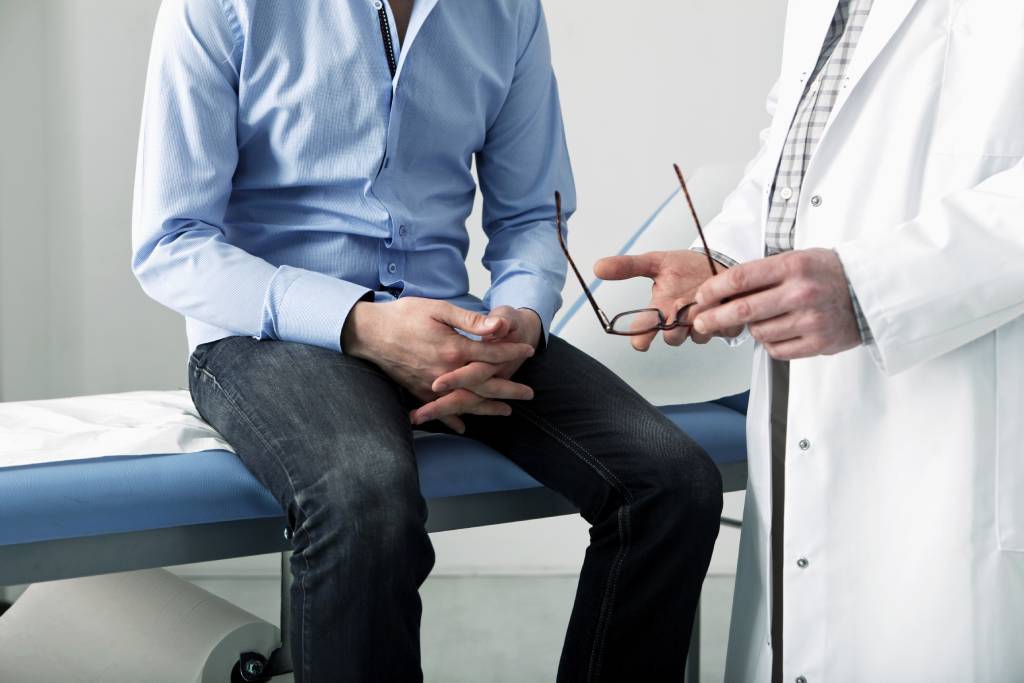Living with prostate cancer can be a challenging and complex journey, impacting various aspects of a person’s life. We’ve discussed the survival rates for prostate cancer elsewhere in our blog but wanted to look more closely at what it may be like living with the disease.
While we recommend talking through a treatment plan with your doctor as soon as you are diagnosed, the National Health Service of the UK explains that “Prostate cancer often gets worse slowly, and you may have it for years without symptoms. During this time, you may not need treatment.”
While specifics differ from person to person, There are some relatively common experiences that those living with prostate cancer often encounter.
Physical Symptoms and Side Effects
Sometimes a person living with prostate cancer may experience no, or very few symptoms. Others, and particularly those living with advanced prostate cancer, may experience:
Urinary Symptoms
Prostate cancer can affect urinary function, leading to issues such as frequent urination, urgency, weak urine flow, or difficulty emptying the bladder.
Sexual Changes
Depending on the treatment approach, men may experience erectile dysfunction, decreased libido, or other sexual difficulties.
Fatigue
Cancer-related fatigue is common and can affect daily activities and overall quality of life. The Cleveland Clinic explains “People who experience cancer fatigue often describe it as ‘paralyzing.’ Usually, it comes on suddenly and is not the result of activity or exertion. With this type of fatigue, no amount of rest or sleep helps.”
Pain
Advanced prostate cancer may cause bone pain, particularly in the lower back, hips, and pelvis.
Emotional and Psychological Impact
In addition to the physical symptoms that prostate cancer may induce, there may be a range of psychiatric or emotional symptoms connected to cancer and its treatment.
Anxiety and Uncertainty
Understandably, the diagnosis and treatment of prostate cancer can trigger feelings of fear, anxiety, and uncertainty about the future. A study of men living with metastatic prostate cancer found that “16% were “extremely” anxious, and 31% were “very” anxious or “extremely” anxious on a non-standardized, 4-point scale.”
Depression
It is not uncommon for individuals to experience depression, sadness, or a sense of loss due to the impact of the disease on their lives.
Body Image Issues
Treatment side effects, such as surgical scars or changes in physical appearance, may affect self-esteem and body image.
Treatment and Recovery
Ideally, part of living with prostate cancer is seeking treatment and experiencing recovery. But even here, there are things to be aware of.
- Treatment Decision-making: Choosing the most suitable treatment option can be overwhelming, requiring careful consideration of potential benefits, risks, and side effects.
- Side Effects Management: Treatments like surgery, radiation therapy, and hormone therapy can result in side effects such as fatigue, nausea, hot flashes, and bowel problems. Managing these side effects can be challenging.
- Follow-Up Care: Regular medical check-ups, monitoring of PSA levels, and imaging scans are essential for ongoing evaluation and detection of any recurrence.
Impact on Relationships and Intimacy
Living with prostate cancer can have an impact on those around you, too.
Partner and Family Support:
Prostate cancer affects not only the individual diagnosed but also their loved ones. Building a strong support network and open communication with family members is crucial.
Intimacy Challenges:
Sexual changes and side effects can impact intimate relationships. Open and honest communication with partners and healthcare professionals can help navigate these challenges.
Lifestyle Adjustments:
As one might expect, living with prostate cancer often causes or necessitates a variety of lifestyle changes. These might include
- Dietary Changes: Some individuals may need to make adjustments to their diet, such as reducing red meat consumption and increasing the intake of fruits, vegetables, and whole grains.
- Physical Activity: Engaging in regular exercise, as advised by healthcare professionals, can help manage fatigue, maintain physical strength, and improve overall well-being.
- Coping Strategies: Finding healthy coping mechanisms such as support groups, counseling, meditation, or engaging in hobbies can contribute to emotional well-being and resilience.
Advancements in medical research and personalized treatment options continue to improve the quality of life for individuals with prostate cancer. Seeking support from healthcare professionals, support groups, and loved ones can greatly assist in navigating the challenges associated with the disease and adapting to life with prostate cancer.
Seeking treatment options for prostate cancer or BPH?
NOTE: The information provided on this website is general medical information and does not establish a physician-patient relationship. Please discuss your particular situation with a qualified medical professional.


